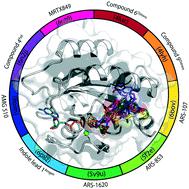当前位置:
X-MOL 学术
›
RSC Med. Chem.
›
论文详情
Our official English website, www.x-mol.net, welcomes your feedback! (Note: you will need to create a separate account there.)
KRasG12C inhibitors in clinical trials: a short historical perspective
RSC Medicinal Chemistry ( IF 4.1 ) Pub Date : 2020-06-01 , DOI: 10.1039/d0md00096e Lisa Goebel 1, 2, 3, 4, 5 , Matthias P. Müller 1, 2, 3, 4, 5 , Roger S. Goody 3, 4, 6, 7 , Daniel Rauh 1, 2, 3, 4, 5
RSC Medicinal Chemistry ( IF 4.1 ) Pub Date : 2020-06-01 , DOI: 10.1039/d0md00096e Lisa Goebel 1, 2, 3, 4, 5 , Matthias P. Müller 1, 2, 3, 4, 5 , Roger S. Goody 3, 4, 6, 7 , Daniel Rauh 1, 2, 3, 4, 5
Affiliation

|
KRas is the most frequently mutated oncogene in human cancer, and even 40 years after the initial discovery of Ras oncogenes in 1982, no approved drug directly targets Ras in Ras-driven cancer. New information and approaches for direct targeting of mutant Ras have fueled hope for the development of direct KRas inhibitors. In this review, we provide a comprehensive historical perspective of the development of promising KRasG12C inhibitors that covalently bind to the mutated cysteine residue in the switch-II pocket and trap the protein in the inactive GDP bound state. After decades of failure, three covalent G12C-specific inhibitors from three independent companies have recently entered clinical trials and therefore represent new hope for patients suffering from KRasG12C driven cancer.
中文翻译:

KRasG12C抑制剂在临床试验中的历史回顾
KRas是人类癌症中最常见的致癌基因,甚至在1982年首次发现Ras致癌基因40年后,也没有批准的药物直接针对Ras驱动的癌症中的Ras。直接靶向突变Ras的新信息和方法为直接KRas抑制剂的开发带来了希望。在这篇综述中,我们提供了有前途的KRasG12C抑制剂开发的全面历史观点,这些抑制剂与switch-II口袋中的突变半胱氨酸残基共价结合,并使蛋白质处于非活性GDP结合状态。经过数十年的失败,来自三个独立公司的三种共价G12C特异性抑制剂最近已进入临床试验,因此对患有KRasG12C驱动的癌症的患者表示了新希望。
更新日期:2020-07-22
中文翻译:

KRasG12C抑制剂在临床试验中的历史回顾
KRas是人类癌症中最常见的致癌基因,甚至在1982年首次发现Ras致癌基因40年后,也没有批准的药物直接针对Ras驱动的癌症中的Ras。直接靶向突变Ras的新信息和方法为直接KRas抑制剂的开发带来了希望。在这篇综述中,我们提供了有前途的KRasG12C抑制剂开发的全面历史观点,这些抑制剂与switch-II口袋中的突变半胱氨酸残基共价结合,并使蛋白质处于非活性GDP结合状态。经过数十年的失败,来自三个独立公司的三种共价G12C特异性抑制剂最近已进入临床试验,因此对患有KRasG12C驱动的癌症的患者表示了新希望。



























 京公网安备 11010802027423号
京公网安备 11010802027423号